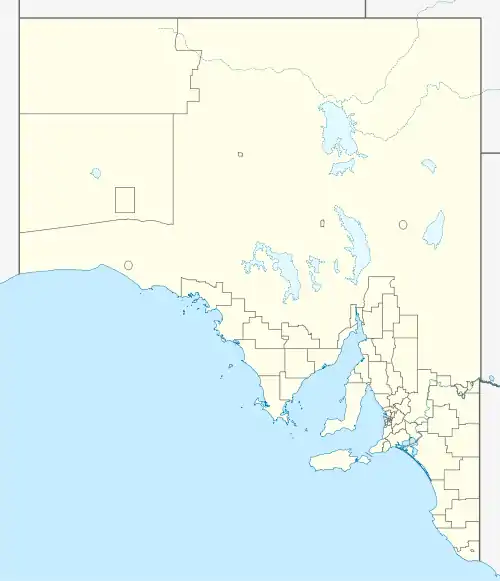Point Whidbey
Point Whidbey is a headland located at the southern western extremity of both Coffin Bay Peninsula and Avoid Bay on the west coast of Eyre Peninsula in South Australia about 34 kilometres (21 miles) west of the town of Coffin Bay. It was described in 2012 as being “fronted by low cliffs and rises to a round hill, 62 metres (203 feet) high, about 1 mile inland.”[1] It is one of the features named by Matthew Flinders in February 1802 after his friend and Royal Navy officer, Joseph Whidbey. The point is currently located within the boundaries of the protected area, the Coffin Bay National Park.[2][3][4][5]
| Point Whidbey South Australia | |
|---|---|
 Point Whidbey | |
| Coordinates | 34°35′18″S 135°6′33″E |
| Location | 34 km (21 mi) west of Coffin Bay. |
References
- Sailing Directions (Enroute), Pub. 175: North, West, and South Coasts of Australia (PDF). Sailing Directions. United States National Geospatial-Intelligence Agency. 2017. p. 180.
- "Point Whidbey". Gazetteer of Australia online. Geoscience Australia, Australian Government.
- South Australia. Department of Marine and Harbors (DMH) (1985), The Waters of South Australia a series of charts, sailing notes and coastal photographs, Dept. of Marine and Harbors, South Australia, p. chart 35, ISBN 978-0-7243-7603-2
- Flinders, Matthew (1966) [1814]. A Voyage to Terra Australis : undertaken for the purpose of completing the discovery of that vast country, and prosecuted in the years 1801, 1802, and 1803 in His Majesty's ship the Investigator, and subsequently in the armed vessel Porpoise and Cumberland Schooner; with an account of the shipwreck of the Porpoise, arrival of the Cumberland at Mauritius, and imprisonment of the commander during six years and a half in that island (Facsimile ed.). Adelaide; Facsimile reprint of: London : G. and W. Nicol, 1814 ed. In two volumes, with an Atlas (3 volumes): Libraries Board of South Australia. p. 225. Retrieved 27 March 2013.CS1 maint: location (link)
- "Parks of the Coffin Bay Area Management Plan" (PDF). Department for Environment and Heritage. 2004. p. 3. Retrieved 21 October 2014.
This article is issued from Wikipedia. The text is licensed under Creative Commons - Attribution - Sharealike. Additional terms may apply for the media files.